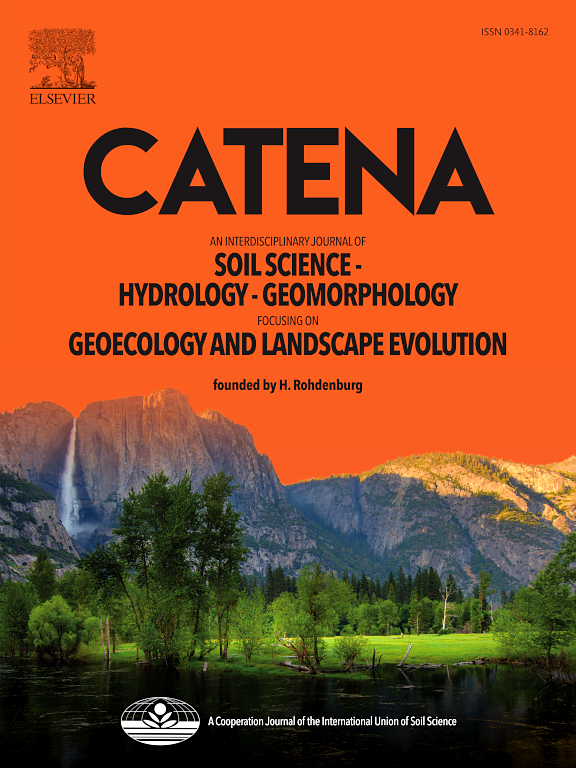亚热带喀斯特山区沿海拔梯度维持土壤多功能性的关键微生物类群和网络复杂性,而非多样性
IF 5.4
1区 农林科学
Q1 GEOSCIENCES, MULTIDISCIPLINARY
引用次数: 0
摘要
喀斯特山地生态系统是全球最具气候敏感性的景观之一,但在这些脆弱的环境中,地下微生物群落与生态系统多功能性(EMF)之间的关系仍然知之甚少。在这里,我们研究了喀斯特山地生态系统中沿海拔梯度的土壤微生物属性——多样性、关键分类群和网络复杂性,以确定土壤EMF的关键驱动因素。结果表明,海拔高度对土壤微生物群落组成和土壤电磁场有显著影响。微生物多样性随海拔升高而降低,而微生物网络复杂性、关键类群和土壤EMF则沿海拔梯度增加。与微生物多样性相比,微生物网络复杂性和关键类群对土壤电动势的正向影响更强。值得注意的是,随着EMF阈值水平的增加,网络复杂性和关键类群对土壤EMF的正向影响逐渐降低,但即使在最高阈值(75%)时,关键类群仍保持显著的正向影响。此外,年平均温度和土壤pH显著影响微生物特征,进而影响土壤EMF。这些发现强调了微生物关键分类群和网络复杂性在环境变化下维持土壤EMF的关键作用,特别是在高应力条件下。这些发现不仅为预测喀斯特山地生态系统的生态系统功能提供了一个框架,而且为全球其他脆弱生态系统的管理和保护提供了有价值的见解。本文章由计算机程序翻译,如有差异,请以英文原文为准。
Microbial keystone taxa and network complexity, rather than diversity, sustain soil multifunctionality along an elevational gradient in a subtropical karst mountain
Karst mountain ecosystems are among the most climate-sensitive landscapes globally, yet the relationship between subsurface microbial communities and ecosystem multifunctionality (EMF) in these fragile environments remains poorly understood. Here, we investigated soil microbial attributes—diversity, keystone taxa, and network complexity—along an elevational gradient in a karst mountain ecosystem to identify key drivers of soil EMF. Our results revealed that elevation significantly influenced microbial community composition and soil EMF. Specifically, microbial diversity decreased with increasing elevation, whereas microbial network complexity, keystone taxa, and soil EMF increased along the elevation gradient. Compared to microbial diversity, microbial network complexity and keystone taxa exhibited stronger positive effects on soil EMF. Notably, the positive effects of network complexity and keystone taxa on soil EMF decreased with increasing threshold levels of EMF, yet keystone taxa retained a significant positive effect even at the highest threshold (75%). Moreover, annual mean temperature and soil pH significantly influenced microbial characteristics, which in turn affected soil EMF. These findings highlight the pivotal roles of microbial keystone taxa and network complexity in maintaining soil EMF under environmental change, especially in high-stress conditions. These findings provide not only a framework for predicting ecosystem function in karst mountain ecosystems but also valuable insights for the management and conservation of other fragile ecosystems worldwide.
求助全文
通过发布文献求助,成功后即可免费获取论文全文。
去求助
来源期刊

Catena
环境科学-地球科学综合
CiteScore
10.50
自引率
9.70%
发文量
816
审稿时长
54 days
期刊介绍:
Catena publishes papers describing original field and laboratory investigations and reviews on geoecology and landscape evolution with emphasis on interdisciplinary aspects of soil science, hydrology and geomorphology. It aims to disseminate new knowledge and foster better understanding of the physical environment, of evolutionary sequences that have resulted in past and current landscapes, and of the natural processes that are likely to determine the fate of our terrestrial environment.
Papers within any one of the above topics are welcome provided they are of sufficiently wide interest and relevance.
 求助内容:
求助内容: 应助结果提醒方式:
应助结果提醒方式:


